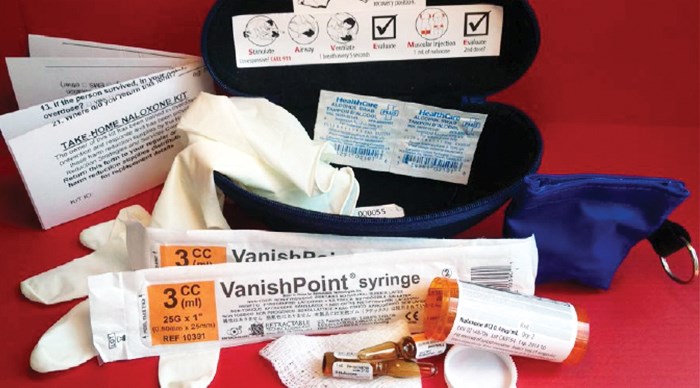Take-home naloxone kits – used for preventing opioid overdose – will be available at Sechelt Hospital this September, once staff have been fully trained with them.
Medical Health Officer with Vancouver Coastal Health (VCH) Paul Marti-quet said the kits are needed due to increases in fentanyl overdoses.
“Our emergency rooms have naloxone,” Martiquet said. “These are kits for take home for people who have loved ones or are users themselves who are concerned about the potential for fentanyl overdose here on the Coast.”
Fentanyl is a synthetic narcotic, made in a lab, and it is 100 times more potent than heroin. Most of it comes from China, according to Martiquet, although he said it’s possible that it’s also being made here as well.
“What we’re seeing here – and it is on the Coast – is people are expecting a certain potency to the drug they’re taking and ODing because there was fentanyl [contamination] and that augmented the effects of the drug 100 fold,” Martiquet said.
So far the take-home kits are available at three emergency departments: Lions Gate, St. Paul’s and BC Children’s hospitals.
“It’s time to take additional actions to make sure that the tragedy of overdoses stops here,” said Health Minister Terry Lake in a press release. “By providing take-home naloxone kits, we recognize that the risk of overdose exists, and secondary overdoses can be addressed by being proactive and by providing even more supports.”
Having naloxone kits widely available is one of the initiatives underway to help address the public health emergency related to the rising number of drug-related overdoses and deaths.
“Seventy per cent of overdose patients treated at emergency departments in the region are being seen at St. Paul’s Hospital,” said Scott Harrison, Director of Urban Health and HIV/AIDS at Providence Health Care (PHC). “We are doing everything we can to effectively and compassionately care for these individuals and their families in these difficult times.”
All of the initiatives support the work of the newly formed Joint Task Force on Overdose Response. Headed by Provincial Health Officer Dr. Perry Kendall and Director of Police Services Clayton Pecknold, the task force will provide expert leadership and advice to the province on additional actions to prevent and respond to overdoses in British Columbia.
“The big picture here is that if you are injecting drugs, know what you’re injecting, know where it came from and inject with someone watching over you,” Martiquet said. “And take a small quantity if you’re not sure what you’re taking so that you don’t overdose.”



